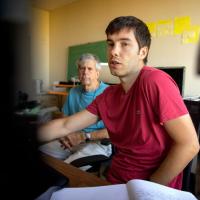The department has a long-standing tradition of engaging and valuing theoretically driven empirical research. This approach to sociology uses sophisticated theoretical reasoning and rigorous methodological tools, many of which are developed by Cornell faculty, to answer fundamental questions about the social world, how it is organized and how it is changing.
In addition to the research areas below, the department also hosts several unique research hubs and institutes on campus. These include:
Center for the Study of Inequality (CSI) Social Dynamics Lab

